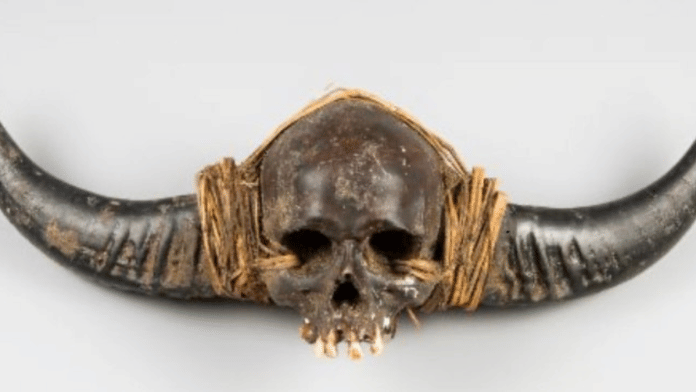Guwahati: The auction of a 19th-century Naga ancestral human skull in the United Kingdom was stopped after the intervention of the Forum for Naga Reconciliation (FNR), a civil body of Naga organisations that also works with Naga anthropologists for the repatriation of ancestral human remains to the homeland. The FNR wrote to the British auction house, after which the Naga human remains were withdrawn from sale as a “mark of respect to the tribe and culture,” an FMR member confirmed to ThePrint.
The Naga human remains, said to have been appropriated by colonial administrators and soldiers who occupied the Naga territorial lands in the 19th century, symbolise “violence that the British colonial power unleashed on the Nagas”, the FNR said in a statement Tuesday.
The Swan Fine Art auction house and antique centre in Oxfordshire was to offer for sale the skull of a Naga ancestor—valued at 3,500-4,000 UK pounds. The biddings were scheduled to begin at 4.30 pm IST (noon BST) Wednesday.
It was part of the ‘Curious Collector Sale’, marked Lot 64, and was to be sold alongside other human skulls from the African continent, including Congo and Nigeria, apart from Papua New Guinea, dating back to the late 19th and early 20th centuries.
The Swan website listed Lot 64 in the ‘Saleroom’ section as a “19th-century horned Naga human skull, Naga tribe”. It also mentioned that this item would likely appeal to collectors specialising in anthropology and tribal culture.
The provenance (origin) of the skulls was traced to the Ex Francois Coppens Collection in Belgium, indicating they were earlier a part of that collection. These human remains remained catalogued alongside antiquarian books, manuscripts, paintings, jewellery, ceramics, and furniture.
Condemning such practices as “inhuman” and “violent”, the FNR said such sales contravene Article 15 of the United Nations Declaration on the Rights of Indigenous Peoples (UNDRIP). The Article grants Indigenous people the right to protect their cultural dignity and diversity, while also requiring states to combat discrimination and promote understanding of Indigenous cultures.
“Such auctions continue the policy of dehumanisation and colonial violence on the Naga people. The auction highlights the impunity that descendants of European colonisers enjoy as they perpetuate a racist, colonial, and violent depiction of Naga people,” the FNR stated.
“Throughout the period of British rule, the Naga people were defined as “savages’ and ‘headhunters’, which are insulting tropes that continue to be perpetuated today,” the statement added.
Later Tuesday, Nagaland Chief Minister Neiphiu Rio wrote to External Affairs Minister S. Jaishankar, urging him to take up the matter with the Indian High Commission in the UK.
“It has been a traditional custom of our people to give the highest respect and honour for the remains of the demised. The human remains of a deceased person belong to those people and their land,” Rio said in his letter.
“…We urge the government of India to do everything possible to ensure that the rights and emotions of our people are protected,” he added.
The sale of the human remains at The Swan website now stands “withdrawn”.
ThePrint reached the Ministry of External Affairs (MEA) for comment, but had not received an official response. ThePrint also reached The Swan over emails but had not received a response by the time of publication. This report will be updated if and when a response is received.
Efforts at repatriation
The incident came to light Tuesday morning when a few Naga civilians, including anthropologist Dolly Kikon, took to social media, exposing the auction and demanding its withdrawal. Kikon is part of the RRaD (Recover, Restore and Decolonise), a research group constituted by the FNR in 2021 to facilitate the repatriation of Naga ancestral remains currently housed at the Pitt Rivers Museum (PRM) in Oxford to the Naga homeland.
In 2020, the PRM contacted the FNR to help facilitate community dialogue around the “future care and return” of the Naga ancestral remains. As part of this process, the FNR formed the RRaD collective—to study and network with indigenous elders, conduct research and generate public awareness about these human remains.
Speaking to ThePrint, Kikon said the urgency shown by the state government was an acknowledgement of the efforts made by the FNR in the repatriation mission.
“This is a historic moment for the Naga people—as the government of Nagaland recognises and supports the work of repatriation facilitated by the Forum for Naga Reconciliation,” she said.
The Pitt Rivers Museum holds the largest collection of Naga cultural artefacts, with approximately 6,466 items, including about 213 ancestral human remains.
In the essay titled “The Unfinished Business of Colonialism: Naga Ancestral Remains and the Healing of the Land” — authored by Arkotong Longkumer from the University of Edinburgh and Dolly Kikon from the University of Melbourne — the authors discuss the collection of Naga ancestral remains housed in the Pitt Rivers Museum. This collection includes human skulls, bones, and even hair attached to various cultural items like basketry, spears, shields, and ornaments.
The origin of these remains is not fully known. Some sources have stated that British administrators confiscated them from Naga villages whereas others were looted during the violence that ensued, the essay mentioned.
The Forum, meanwhile, called upon the governments of India and the United Kingdom to help in the repatriation of the Naga human remains through “fair, transparent and effective mechanisms”.
The organisation also listed two past instances when similar auctions were stopped — the sale of Egyptian human skulls and the sale of skeletal remains in Angus, Scotland.
The FNR expressed its solidarity with other communities featured in the auction, who were being “dehumanised along with the Nagas”.
This is an updated version of the report
(Edited by Madhurita Goswami)






